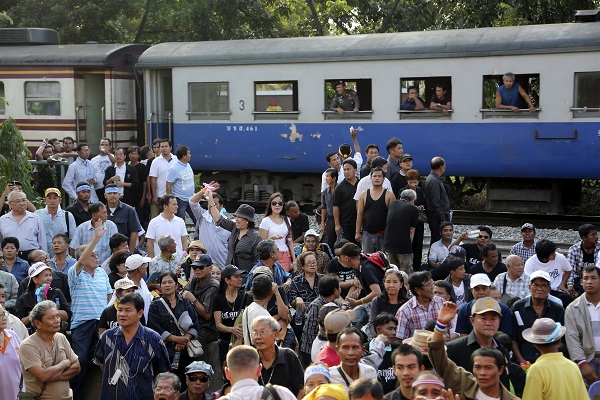Thai amnesty bill sparks street protests

Passengers in the train look at anti-government protesters’ rally against the amnesty bill in Bangkok, Thailand, on Thursday, Oct. 31, 2013. Thousands of protesters and supporters of opposition Democrat Party took part in the rally near Samsen railway station to oppose the amnesty bill being debated in the second reading in the Parliament. AP PHOTO
BANGKOK, Thailand—Anti-government protesters returned to the streets of Thailand’s capital Thursday as parliament debated a political amnesty which opponents fear will “whitewash” past abuses and allow ousted premier Thaksin Shinawatra to return.
Critics of the controversial legislation say it could unleash a fresh bout of political turmoil in a country rocked by a series of rival demonstrations since royalist generals toppled Thaksin in 2006.
Thousands of people joined a rally against the planned amnesty outside a railway station in Bangkok on Thursday evening, some wearing bandanas reading “Fight” and waving clappers with the slogan “Stop the amnesty for corrupt people.”
“If a murderer kills someone and later he gets an amnesty, then the country will not be peaceful,” said Surapol Srimawong, 56, from the northeastern province of Korat.
“It would mean any leader can kill whoever and after killing he can issue the amnesty bill, then it would be terrible.”
Article continues after this advertisementAccording to national police spokesman Piya Uthayo, around 6,500 people joined the rally organized by the opposition Democrat Party.
Article continues after this advertisementThe ruling Puea Thai Party of Prime Minister Yingluck Shinawatra—Thaksin’s sister—has ordered all its lawmakers to support the amnesty bill, which would cover crimes related to political unrest since 2004. A vote is expected in the coming days.
Supporters of the legislation say it will draw a line under years of turmoil culminating in mass pro-Thaksin “Red Shirt” protests in 2010 that left dozens of civilians dead in a military crackdown.
New York-based Human Rights Watch has said a blanket amnesty would “allow officials and protest leaders who have blood on their hands to go unpunished.”
“By whitewashing past abuses, the government denies justice to victims and tells future abusers they have little to fear,” said HRW Asia director Brad Adams.
In 2010 mass rallies by the Red Shirts against the previous government ended in the kingdom’s worst civil violence in decades, with more than 90 people killed and nearly 1,900 wounded in street clashes and a military crackdown.
A series of earlier protests by their arch-rivals, the royalist “Yellow Shirts,” helped to trigger the coup that toppled Thaksin.
The former telecoms tycoon is loved by many rural and poor Thais for his populist policies while in power, but his opponents accuse him of being corrupt, dictatorial and a threat to the monarchy.
Thaksin, the former owner of Manchester City football club, lives in self-imposed exile in Dubai to avoid prison for a corruption conviction imposed in his absence in 2008.
He contends that the jail term—linked to a controversial purchase of state-owned land by his wife—was politically motivated.
In 2010 a court also seized $1.4 billion of the Thaksin family assets for abuse of power after he was targeted by an anti-corruption panel appointed by the post-coup junta to investigate him.
Thaksin ‘chief beneficiary’ of bill
As well as pardoning people involved in political protests, the amnesty would also cover people accused by persons or organizations set up after the 2006 coup, according to a copy seen by AFP.
Thaksin would be the “chief beneficiary” of the amnesty, said Paul Chambers, director of research at the Institute of South East Asian Affairs at Chiang Mai University in northern Thailand.
“If the amnesty is passed, if the Constitution Court does not oppose it and if the king endorses the amnesty law, then of course Thaksin will return to Thailand,” he added.
The opposition—which was in power at the time of the 2010 crackdown—has threatened to intensify its planned rally until the amnesty bill is withdrawn.
The Red Shirts and families of the victims have also decried the idea of an amnesty.
Phayaw Akkahad, the mother of a nurse who was gunned down in the grounds of a Buddhist temple while treating injured Red Shirts on May 19, said she wanted Puea Thai to carry out its election campaign pledge to find justice.
“But look at what is happening—soldiers who killed people have never gone to jail,” she told AFP.
“This bill will bring more violence and might cause people to be killed again.”—Thanaporn Promyamyai